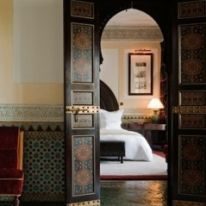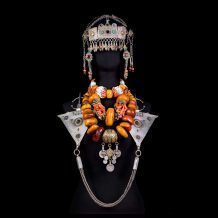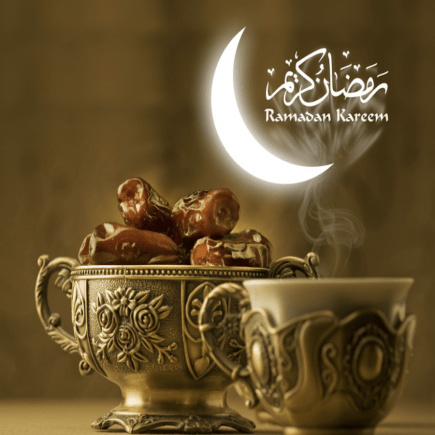
What You Need to Know if You’re Visiting Morocco During Ramadan
What is Ramadan?
Ramadan, considered as the most important holiday in Islam, happens on the ninth month of the twelve-month lunar calendar followed in Islam. These lunar months are twelve days shorter than the Gregorian calendar, so Ramadan occurs earlier in each Gregorian year. Each day when the sunsets after the fourth prayer families join together to celebrate their first meal of the day, the Iftar, Moroccan breakfast.
How long do Muslims fast during Ramadan? Am I expected to observe Ramadan?
During Ramadan, a holy holiday, all Muslims fast from sunrise to sunset for one month, only eating after sundown. Non-Muslims are not expected to observe Ramadan, but should be sensitive about not breaking the fast in public. In its observance, Ramadan parallels the traditional Christian Lent. The ninth month of the Islamic calendar, it commemorates the time in which the Koran was revealed to Muhammad. The Ramadan fast involves abstention from food, drink smoking and sex during daylight hours throughout the months. It is forbidden to even drink water. While Ramadan may seem like a perplexing holiday to non-Muslims, non-believers may be surprised to learn how much Muslims look forward to the fast. Many feel it is a time of spiritual healing and cleansing. Post Ramadan, many Muslims participate in Shawwal, a six-day fast following Aïd el Fitr (Eid ul-Fitr or Id-Ul-Fitr).
During the times when you are allowed to eat, it is important to only eat healthy and nutritious things good for your body. The point of Ramadan is to show devotion to Allah and to become a master in self-discipline.
There are a few groups that are exempt from Ramadan, but are expected to make up the days during a later time. These groups include menstruating and postpartum women, pregnant and breast-feeding women, travelers and anyone who feels sick or weak. In addition, children before puberty do not have to fast although many do so to practice for half the day.
As a visitor to Morocco you are not required to observe Ramadan. Locals will not anticipate that you will be fasting and therefore be accommodating as possible. Morocco has a long history of coexistence and a former, large Jewish population hence their appreciation and acceptance for travelers from other cultures and religions is deeply respected.
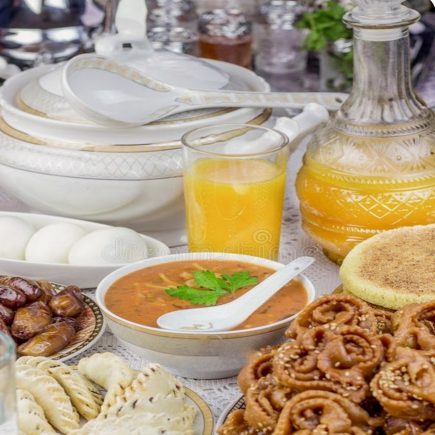
Are restaurants open during Ramadan and do they serve wine and beer?
Most of the local cafes and restaurants close during the day during Ramadan, some closing for the entire month. For this reason, your travel agent can recommend how to participate in a Iftar Breakfast with a family as to enable you, as a traveler, to experience Ramadan first hand. At sunset signaled by the sounding of a siren and the lighting of lamps in all city minarets an amazing sense of calm takes over the streets as the fast is broken for the day. The majority of touristic boutique riads, hotels and restaurants that serve Western cuisine remain open during Ramadan. These establishments will serve wine and beer to foreigners yet not to Moroccans. It is against the law in Morocco to serve alcohol to Moroccans during Ramadan.
While Ramadan may seem like a perplexing holiday to non-Muslims, non-believers may be surprised to learn how much Muslims look forward to the fast. Many feel it is a time of spiritual healing and cleansing. Post Ramadan, many Muslims participate in Shawwal, a six day fast following Aïd el Fitr (Eid ul-Fitr or Id-Ul-Fitr).
Since Ramadan is a holiday about learning to become a better person, Muslims prepare foods and buy presents to give to their friends, family and the poor.
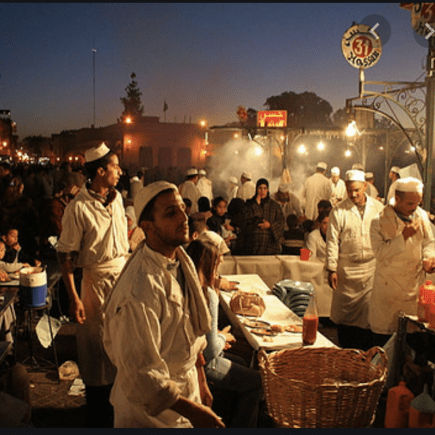
Will I be able to enjoy site seeing at Morocco’s Sites & Monuments during Ramadan?
In Morocco, museums, sites and monuments are all open for site seeing. While hours may differ slightly it is possible to tour Morocco and explore the Imperial Cities during this time. Site seeing at Morocco’s Sites and Monuments during Ramadan typically open between 1-2 hours later and close at standard business hours. Visitors should anticipate being able to touring sites from approximately 11:00am – 5:00pm.
After the Iftar breakfast the local squares and cafes come alive in the night as locals head out to celebrate the long day’s fast. In Marrakech families flock to the Medieval, historic Jemma el-Fna Square and participate in the evening activities. Lanterns after dusk surround light up the square with snake charmers, henna artists, live acrobats and monkeys.
What Should I experience if I visit Morocco During Ramadan?
An essential experience not to be missing if you visit Morocco during Ramadan, is to participate in an Iftar, Moroccan breakfast. There are many restaurants that offer an Iftar experience along with entertainment. If you prefer to have a more unique experience, then there is the option to break the fast with a local Moroccan family.
Traditionally the daytime for a Moroccan Woman during Ramadan involves a lengthy preparation of the first meal after a day of fasting. This meal to break-the-fast is called Iftar. A special table setting is prepared, with a variety of Moroccan breads, fruits, dates, milk, juice, harira soup, Moroccan sweets, eggs, tagines, along with tea and coffee. This spread of food depends greatly on the region of Morocco. At the breaking of the fast, everyone in the cities and villages spend their evenings celebrating with food and entertainment.
As a visitor to Morocco you can experience the sacred Iftar meal with a local family throughout the table setting process, with the call of prayer signifying the beginning of break-fast, beginning with dates and milk before progressing into the feast. This unique experience can be arranged by your Morocco travel agent who will have ties with local families through Morocco’s Imperial Cities.
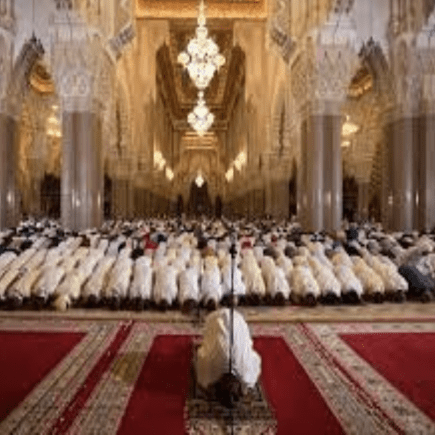
Is Ramadan a good time to Visit Morocco?
Visiting Morocco during Ramadan will offer you the opportunity to experience an event and festivities that happen only one time each year. Ramadan is an important part of Moroccan culture. Ramadan is also a spiritual time for Muslims and exploring the country during this time will allow for an up close experience to learn more about Moroccan rituals and Islamic traditions. The ability to participate in the Iftar break fast and also the surrounding activities is what makes visiting Morocco during Ramadan truly special. At the end of the day’s fast you will hear the announcement of cannons, see thousands of people attending prayer at their local mosque and witness tables of food spread out to feed those who are hungry. Morocco’s markets also feature special Ramadan foods that are prepared during this holiday only. If you are a foodie then Ramadan is the ideal time to visit Morocco given many of the special Ramadan foods are not made at other times of the year.
For more information about where to experience a Ramadan Iftar Meal in Morocco

